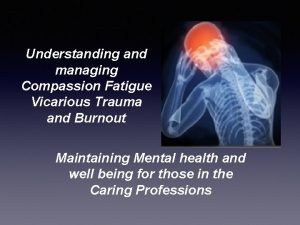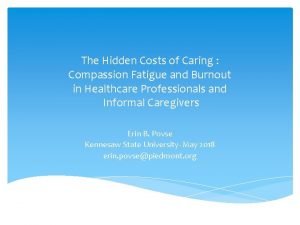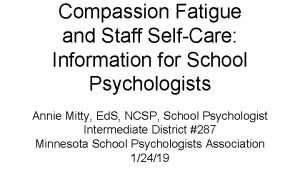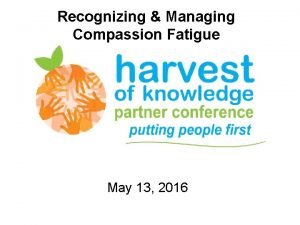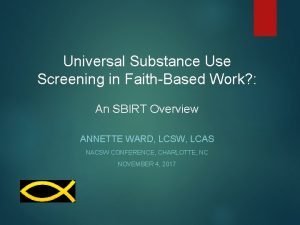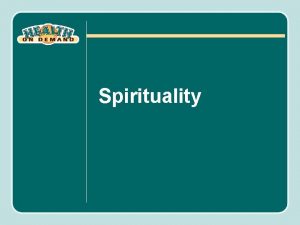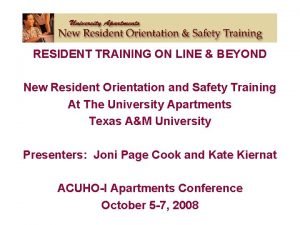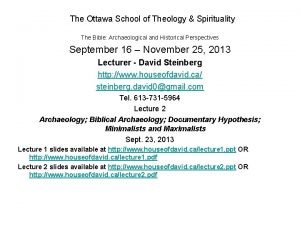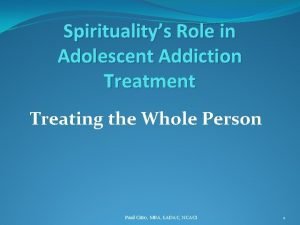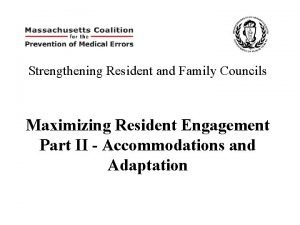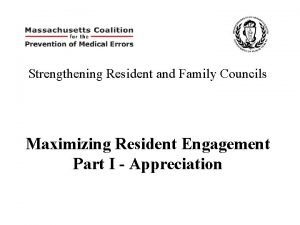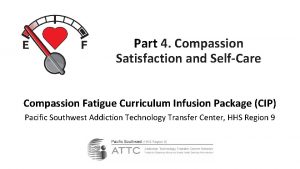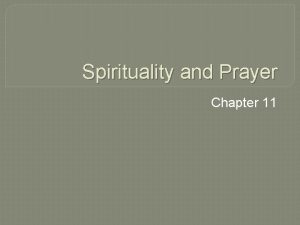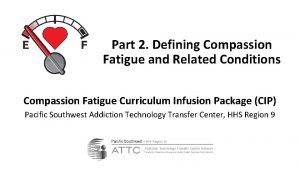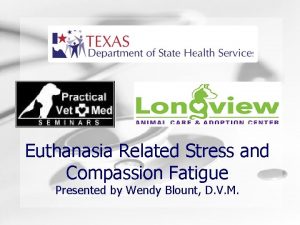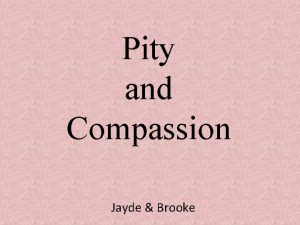Compassion Fatigue and Resident Spirituality Are They Related














- Slides: 14

Compassion Fatigue and Resident Spirituality: Are They Related? Lisa Zak-Hunter Ph. D, LMFT Tara Neil MD Jessica Jarvis MD Emily Manlove MD

Disclosures • None

Introduction • ¼ FM residents report high burn-out or depersonalization. • Of family medicine physicians, 70% felt they were religious and 58% used it to help with coping. • Residents in primary care with poorer spiritual well-being have poorer overall health ratings when controlling for mood. • VCFMR has a significant number of residents with strong religious beliefs that influence care.

Project Description Pre-post survey design • Pre: Online survey completed 2 x (early and mid academic year) • Intervention: Group meetings (6, 1 hr sessions) • Post: Online survey will be completed after the intervention is complete.

Research Questions • Do our residents experience burn-out, low compassion satisfaction, or secondary trauma? • Are there differences in compassion satisfaction, burnout, and secondary trauma based on faith practice? • Do our residents experience different levels of burnout, low compassion satisfaction, or secondary trauma at different times of the academic year?

Methods: Measures • Professional Quality of Life Scale (Pro. QOL 5) – Subscales • Secondary Trauma • Burn-out • Spirituality Questions – My faith/spirituality influences my approach to patient care. – My faith/spirituality helps protect against compassion fatigue. – I participate in faith-based or spiritual practices (e. g. prayer, meditation, services).

Methods: Participants Time 1 (n=58) Early Academic Year Time 2 (n=34) Mid Academic Year Time 3 Post-Group % Female 44. 8 41. 2 TBD % PGY 1 20. 7 11. 8 TBD % PGY 2 32. 8 20. 6 TBD % PGY 3 13. 8 20. 6 TBD % Faculty 32. 8 47. 1 TBD Age (m & SD) 33. 02 (9. 14) 34 (8. 71) TBD

Results: Pre-survey (overall) 45, 0000 Raw Level Score 40, 0000 <22 35, 0000 Low 22 -41 Average 30, 0000 >42 25, 0000 High Time 1 Time 2 20, 0000 15, 0000 10, 0000 5, 0000 0, 0000 Compassion Satisfaction Burnout Secondary Trauma

Results: Pre-survey My Faith Influences My Approach to Patient Care Category Time 1 Time 2 Compassion Satisfaction Non sig Burn Out Positive Association Non sig Secondary Trauma Non sig Positive Association

Results: Pre-survey My Faith/Spirituality Helps Protect Against Compassion Fatigue Category Time 1 Time 2 Compassion Satisfaction Non sig Positive Association Burn Out Positive Association Secondary Trauma Non sig Positive Association

Results: Pre-survey I Participate in Faith Based or Spiritual Practice Category Time 1 Time 2 Compassion Satisfaction Non sig Burn Out Non sig Positive Association Secondary Trauma Non sig Positive Association

Discussion • Overall, our residents report low levels of burn out and trauma. • Faith does play a role in patient care. – Positive or negative? • ‘Servant leaders’, ‘heart for service’

References • Lebensohn P, Dodds S, Benn R, Brooks AJ, Birch, Cook P, et al. Resident wellness behaviors: Relationship to stress, depression, and burnout. Family Medicine. 2013; 45(8): 541 -549. • Farr CA, Lantos JD, Roach BS, Sellergren MA, Marshall CH. Religious characteristics of U. S. Physicians, A national survey. J Gen Intern Med. 2005; 629 -634. • Yi MS, Luckhaupt SE, Mrus JM, Mueller CV, Peterman, AH et al. Religion, spirituality, and depressive symptoms in primary care house officers. Ambulatory Pediatrics. 2006; 6: 84 -90. • Yi MS, Mrus JM, Mueller CV, Luckhaupt SE, Peterman AH, et al. Self-rated health of primary care house officers and its relationship to psychological and spiritual well-being. BMC Medical Education. 2007; 7: 9

Please evaluate this presentation using the conference mobile app! Simply click on the "clipboard" icon on the presentation page.
 Compassion fatigue signs
Compassion fatigue signs Ofcfbrazil
Ofcfbrazil Ted talk compassion fatigue
Ted talk compassion fatigue Compassion fatigue definition
Compassion fatigue definition Insidan region jh
Insidan region jh Two types of physical
Two types of physical Health related fitness and skill related fitness
Health related fitness and skill related fitness Reds motivational interviewing
Reds motivational interviewing What is the difference between spirituality and religion
What is the difference between spirituality and religion Telephone 911
Telephone 911 Ottawa school of theology and spirituality
Ottawa school of theology and spirituality Spirituality and addiction
Spirituality and addiction What is income tax
What is income tax Resident and family engagement
Resident and family engagement Resident and family engagement
Resident and family engagement
